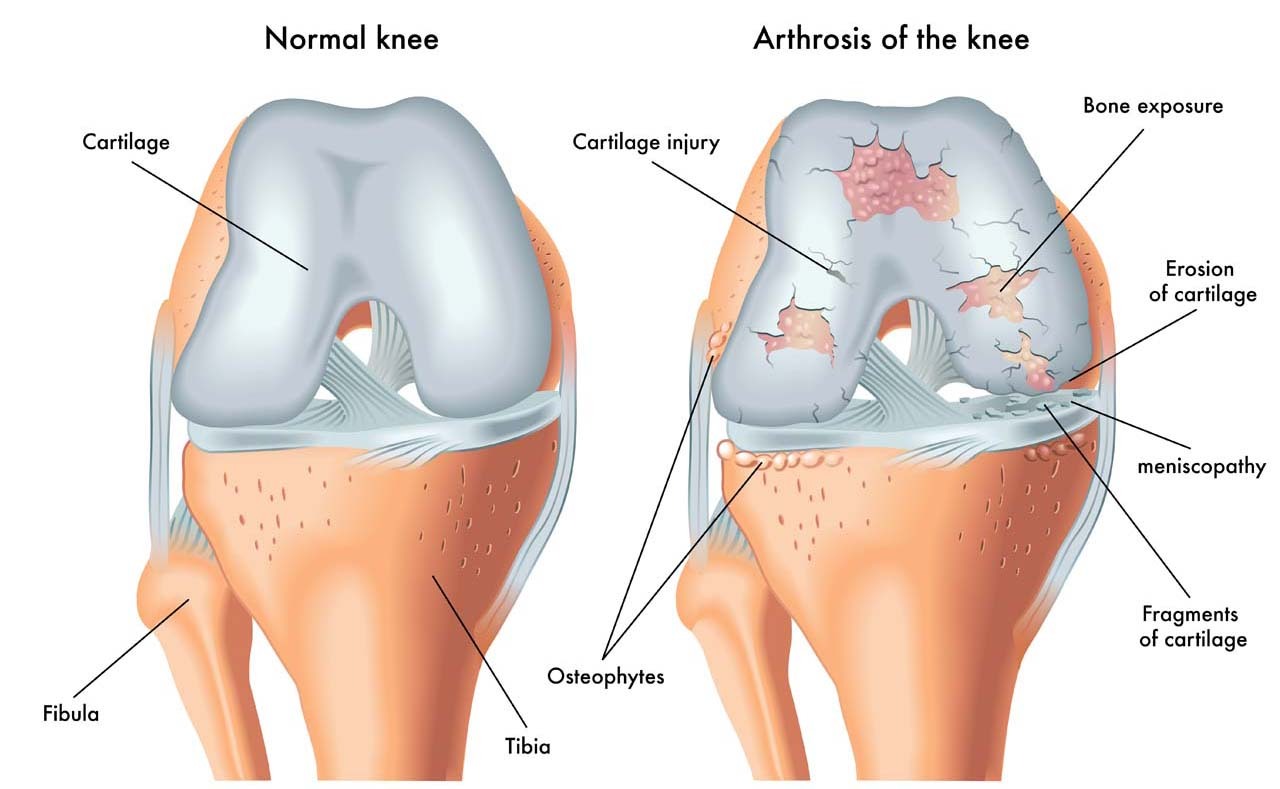What to eat to keep your knee joints healthy
Eating food rich in carbohydrates makes us overweight. When we eat carbohydrates, our body will create glucose from it – it’s blood sugar from which you can get (fast) energy. However, the human body cannot handle huge amounts of blood sugar, so the body will produce insulin hormone, which will remove excessive amounts of blood sugar from the bloodstream. Insulin will store removed blood sugar in fat cells. This is why we will gain weight by eating food rich in carbohydrates. When eating food rich in carbohydrates, we also are at risk of developing type 2 diabetes. Just because the body cells will finally create resistance to normal levels of insulin, that is because the body cells have been long-bombarded with insulin hormones. By eating high-fat dairy products, fruits, vegetables and berries low in carbohydrates, meat products containing saturated fat, etc. Our body is generating (slower) energy which will not rise significantly blood sugar levels. It’s very clear that obesity is a huge risk factor for knee osteoarthritis.

It’s no secret that overweight people eat low-fat products and a lot of carbohydrates. Official dietary guidelines recommend you eat low-fat dairy products, fruits and vegetables and whole grain products. Wheat products are the main source of carbohydrates as well as some vegetables, such as potatoes. These products dominate our food table. However, since Senator McGovern’s committee established these guidelines in 1977, which are followed throughout the Western world, we have more health problems and more overweight people than ever. I think we should have alarm bells ringing by now!
Wheat products contain a protein called gluten, which is officially related to more than 200 known diseases, including mental disorders, cancer and rheumatoid arthritis, the inflammatory type of arthritis. Many people also have wheat allergies, intolerances and celiac disease. Wheat also increases hunger, so you will eat more. By eating high-fat products and avoiding wheat and high-carbohydrate vegetables, you will notice a decrease in your appetite, and you won’t need any snacks between meals. Some people develop schizophrenia, and others will get rheumatoid arthritis by eating grain products. Also, some people will live happily by eating all kinds of grain, but the same can happen with smoking: Some smoke 40 years and nothing happens, which does not mean smoking is not directly related to many diseases. Moreover, wheat is claimed to behave like opiate – you will be addicted to it, but it does not make you “high.” Instead, it will make you hungry.
I know it’s hard to believe but think about it: Wheat does not need any mammal to eat the seeds in order to spread the seeds around, so it protects itself by being poisonous. Compared with berries or fruits like apples, which are using mammals to spread their seeds, they provide energy to animals in exchange for spreading the seeds (that’s why they have nutritive substance surrounding their seeds). The seeds will end up deposited in a natural fertilizer, which will in turn end up growing into new big trees. No, you will not die immediately when you eat grain products, because not all poisons are strong enough to kill you right away. Instead, the “animal” will get the second chance, and it works as a sign to stop eating the ”grass” seeds.
The wheat proteins can leak into the bloodstream and trigger autoimmune disorder. The problem is that wheat proteins mimic the normal body proteins, so the autoimmune system of the human body will produce antibodies to attack foreign proteins that instead attack self-proteins (the body’s own proteins), which can cause rheumatoid arthritis as well as many other chronic diseases. Finnish orthopedist Antti Heikkila has told his patients to change their eating habits and avoid grain products. Those patients who had quit eating grain have reported significant improvements in their overall health, not to mention that many have cured their rheumatoid arthritis.
We have not changed genetically since we were living in caves, hunting animals and collecting berries. In fact, every anthropologist will tell you by just looking at the human skeleton whether this person was a hunter-gatherer or belonged to a farming community. Hunter-gatherers had better teeth, were taller and had thicker bones as a clear indication of muscle strength.
We have studies that have found a correlation between eating high-fat products and heart disease, but I’m not convinced at all. For example, the great “France Paradox:” French are famous for eating lots of saturated fat products, and still their heart disease rates are half of what the United States has. But, if you select some area from the former Soviet Union, where people drank a lot of alcohol and had lot of stress — many people didn’t have jobs, for example — there also are high rates of heart disease. If they also happen to eat a lot of saturated fat, can you conclude that it’s due to their eating habits? Of course not! You cannot use the facts out of context. It’s called the manipulation of truth! Margarines containing trans fats are the only ones without doubt proven to be directly related to heart disease.
Also, you should not take snacks between meals, and two or three meals per day is enough. Digestion process and using the energy are two different processes. You should eat and then use the energy (the body), but when you eat all the time, you are overusing your body and as a result will feel tired. When you eat all the time, your body will perform slowly, like a computer with too many processes running in the background.
You should be aware that most highly processed, ready-to-eat meals contain monosodium glutamate — sodium salt, also known as flavour enhancer. Sodium salt is an addictive neurotoxin that simulates the taste buds, so it makes you to desire the taste, and you’ll keep on buying and eating the product. Literally, this supplement makes inferior quality food taste good, and it’s therefore loved by companies producing fast foods. Of course, it should come as no surprise that sodium salt is related to many neurological diseases. Also, you should throw out the microwave oven from the kitchen window, as it is changing the food at molecular level so the body cannot recognize it anymore.
Critics are claiming that by avoiding grain products, you are not consuming enough fiber. Well, there is no clear evidence that fiber is crucial for health, but in every case, it would be no problem, because you’ll get sufficient fiber from berries, fruits and vegetables. Other critics will tell you that producing meat will produce way too many greenhouse gases, which are destroying the planet, and we cannot feed the world if we are not all eating grains. Come on, guys. We all know that right now we produce enough food to feed three times the current world’s population. Problem is, we are not distributing it around the world but instead are throwing it away. Nobody wants to address the problem of food distribution so we can finally eliminate hunger. Instead, some ”gurus” want to produce more wheat to throw away locally. If we really would care about our planet, we would not use airplanes to go for a holiday for a week to other side of the planet to drink beer and sunbathe. We would not keep the Christmas lights on while we sleep, and we would not spend hours in traffic jams while driving to work alone in our car. We would ask our senators and presidents to invest in renewable energy, although it would mean higher energy prices. Our leaders lack the political will to change things because we don’t demand them, as we would not like to pay the price. To quote the famous astrophysicist Carl Sagan: “There is no hint that help will come from elsewhere to save us from ourselves.”
In summary, good food is natural and unprocessed food. Now you are able to make your own conclusions. I know it’s not easy to change old eating habits. Amongst other things, it requires a lot of willpower, but it’s worth it. Denying fast food and all kinds of “cookies” requires determination, but you have to lose something if you want to gain something. The good news is, however, that natural meals low in carbohydrates is really delicious.
.png)


 Canadian Dollar
Canadian Dollar  US Dollar
US Dollar 






























.png)
